There aren’t many worker-owned retail shops, but The Big Carrot has provided a one-stop shop for all things health and wellness related since they opened their worker-owned store in 1983. They’ve supported the development of a healthy and sustainable food system by purchasing from small local, organic producers whenever possible and by ensuring each product meets their set of rigorous standards. All of this is supported by providing their team with satisfying employment in a fair and productive workplace.
We chatted with Marketing Manager Sarah Dobec from The Big Carrot about how they got started, their partnerships with local farms, and how they keep their environmental impact as low as possible.
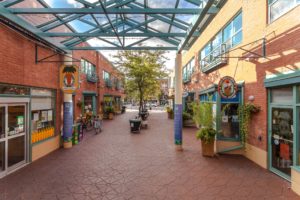 WEHL: What does wellness mean to The Big Carrot?
WEHL: What does wellness mean to The Big Carrot?
SD: Wellness is the state of being in good physical and mental health and for every individual this can mean something different. The Big Carrot offers a variety of holistic approaches to a balanced, healthy life. First and foremost, we are committed to selling wholesome, organic food. We know that our diet directly impacts our health and we go to great lengths to procure the best quality food. We are committed to organic, non-GMO, local, fairly traded and sustainable seafood in our purchasing; this way our shoppers know they are choosing from products that meet these standards. This equates to healthy eating and socially conscious shopping knowing that your choices can include supporting the environment, fair labour and healthy oceans, to name a few.
We also believe strongly in contributing to and helping to build our community. Weekly, we host free workshops with local experts on a variety of health topics in the community space above our Danforth location. And finally, embedded in our mission is to always give back to our neighbourhood through donations and sponsorships of local projects and organizations. We believe that wellness is nurtured in community and good food.
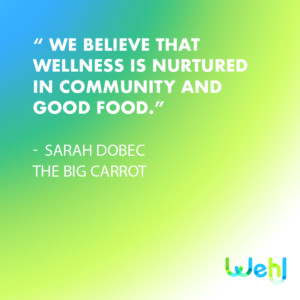
WEHL: Tell us how The Big Carrot got started with their 9 founders.
SD: Back in November 1983, The Big Carrot opened its doors for business across the street from our current Danforth location. Owned and operated based on the principles of a worker owned co-operative, The Big Carrot was the first health food store to offer a one stop shopping experience with a vegetarian deli, organic produce department and a selection of frozen natural meat products.
The Big Carrot came about when five workers in a natural food store found themselves unemployed. They had bought shares in the company where they worked but discovered later that they had no say in running the store. Knowing they wanted to keep working together they were looking for a working model for their new enterprise. A chance viewing of The Mondragon Experiment, a BBC documentary about a successful large-scale worker co-operative system in Spain suggested a possible solution to the power problem. One share, one vote. Seven of the founding partners had experience in natural food retail: Mary Lou Morgan, Grant MacKinnon, Patricia Smith, Daiva Kryzanauskas, Les Bowser, Jane Langmuir, Jerry Lewicki. One partner was involved in a housing co-op (David Dennis) and one partner was a novice (Akemi Kobayashi).
The group negotiated personal loans with Bread & Roses Credit Union to bring their contributions to $5000 each (50 class B shares) totaling $45,000. By pooling their capital they garnered the bank’s support, which gave them the credibility to seek new investors. They received a $50,000 loan guaranteed by Ottawa under small business legislation and raised another $ 28,000 from investors and friends in the form of Class A shares (non-voting shares).
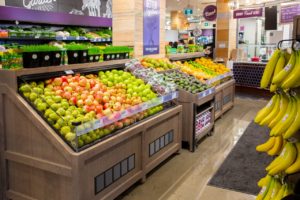 The partners looked for locations in various areas of the city. Back in 1983, the Danforth area was in transition with many young families moving in, so several partners surveyed the neighbourhood and decided that Riverdale was ready to support a local health food store. The location was at 349 Danforth Ave., 2,000 square feet, now occupied by Second Cup. A lot of work needed to be done before it opened, as the space was in bad shape. The store was designed, built and painted by its owners.
The partners looked for locations in various areas of the city. Back in 1983, the Danforth area was in transition with many young families moving in, so several partners surveyed the neighbourhood and decided that Riverdale was ready to support a local health food store. The location was at 349 Danforth Ave., 2,000 square feet, now occupied by Second Cup. A lot of work needed to be done before it opened, as the space was in bad shape. The store was designed, built and painted by its owners.
Natural food stores at that time were predominantly small ma & pa shops that lacked in fresh products and relied mainly on vitamins for sales. The need for a one-stop natural food store was in demand and The Big Carrot was able to provide that experience, introducing natural foods to a neighbourhood not accustomed to so much natural food selection. Organic food was virtually unknown at that time, limited to some European products.
Busting at the seams at its original location in 1987, the group was fortunate to meet David Walsh, a real estate developer. Both worked on developing the concept and construction of what we now know as Carrot Common. A property available across the street, formerly a car dealership owned by the Playter family, would be a perfect location. The Big Carrot needed to come up with money to secure anchor tenancy in the new development, so they decided to seek new investors. A small sign on the cash register asked customers to invest $5,000 at 10% for an indeterminate length of time. Over the next eight months $264,000 in non-voting shares was raised from customers. Suppliers forwarded $150,000 of inventory and the Federal Business Development Bank lent $250,000 and The Big Carrot was able to finance their expansion into Carrot Common.
The Big Carrot then had 13 worker owners and 25 staff and offered a full service natural meat department. A little ahead of ourselves, there was little demand for fresh meat to make it successful as this concept was a bit foreign to health food shoppers at that time. The space was later shared with our Body Care & Supplements Departments. The Big Carrot then expanded to the location next door, formerly Sanelli’s, an Italian Food Deli. Supplements and Body Care split into 2 separate departments. As business grew, The Big Carrot continued to occupy other retail spaces in Carrot Common. Supplements across the courtyard became its own Wholistic Dispensary and the Organic Juice Bar is located at the front of the mall.
In 2006, The Big Carrot Danforth Community Market experienced its biggest expansion and renovation. In June 2018, we opened our second location in the Toronto Beaches community. The Big Carrot has grown into Canada’s largest worker owned natural food market and continues to set standards for quality and selection of natural foods while observing a worker-owner model.
WEHL: The Big Carrot is worker-owned. What does that mean for your employees?
SD: In our worker owner model, employees are given the option to buy shares in the business after 3 years of employment. One common voting share is included in the buy-in which we use to elect our board of directors and vote on decisions for the company.
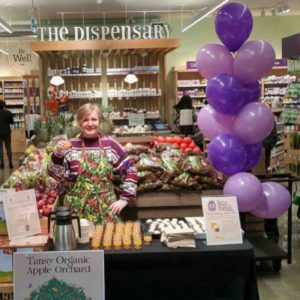 WEHL: The Big Carrot hires nutritionists in their stores; why do you do that?
WEHL: The Big Carrot hires nutritionists in their stores; why do you do that?
SD: Our nutritionists offer a service to our customers who have questions or need guidance making food choices. Many people arrive with a list of foods they have been told to avoid and they need guidance finding alternatives. Our nutritionists are able to help customers understand their health condition better and why making different food choices will improve their health. I’ve seen dozens of customers arrive confused or frustrated but leave with a healthy bag of groceries and better sense of control of their new eating regime.
WEHL: There are often Speaker Series educational events held at The Big Carrot; why do you do this and how do you choose your speakers for these events?
SD: Our Speaker Series is an element of our commitment to building community. The workshops are free and open to anyone who is interested in the topic. The topics are usually health related and bring like minded people together to expand their knowledge. Local experts often reach out to us with their workshop ideas, as well we invite certain speakers based on trends and themes.
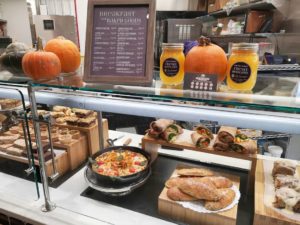
WEHL: You were the first store in Ontario to certify to the Canada Organic Standard. What does this standard mean, and is all of your produce organic?
SD: Yes, in 2009 the new Canadian Organic Standard came into effect and The Big Carrot decided to support and commit to the new regulations by certifying our food handling. It’s important that the standard is upheld throughout the whole value chain. Our produce section is all organic, less a few wild, seasonal items like blueberries and mushrooms. Anywhere we handle or repackage organic products is also under our certification; this would include our bulk, cheese, meat and kitchen departments. We prioritize organic in all our purchasing.
WEHL: Do you have any partnerships with local farms that help to stock your produce?
SD: Yes, we are very proud of our farm partners. We work directly with over 50 local farmers to supply our produce, meat and dairy. We’ve worked with Tansy Apple Farm and Pfenning’s Organic Farm since 1983. Every year we host a farm trip to one of our local farms for our customers to meet the people who grow their food and learn more about farm life.
WEHL: What are some of the ways that the Big Carrot keeps its environmental impact low?
SD: This is a challenge for all retailers because of packaging, the increased use of plastic and limitations on municipal compost and recycling services. We have tried many things over the years as better options became available but currently we work with our customers to reduce our environmental impact. We offer discounts when customers bring their own containers for food or bulk. We give generous bonus points when you bring your own bag or purchase reusable produce bags.
We compost our food waste and produce cuts through our waste management partner and limit our use of toxic cleaners except where required by law.
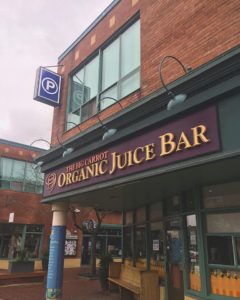 WEHL: You operate a wellness department that carries a number of “body care” products. Are there certain standards that a product must meet for you to carry it?
WEHL: You operate a wellness department that carries a number of “body care” products. Are there certain standards that a product must meet for you to carry it?
SD: Our Body Care standard is mostly about what the products don’t have in them. We prohibit ingredients like parabens, petroleum, SLS, formaldehyde, phthalates, propylene glycol and many others. The prohibited list is based on ingredients that could be harmful to human health. Less is more in our Body Care department and we are able to offer hundreds of effective products without harmful chemicals.
WEHL: What types of professionals do you work with to inform the selection of natural health products that you carry in your dispensary?
SD: Over the years we have had a great variety of health practitioners working in our Wholistic Dispensary including Naturopathic Doctors, Nutritionists, Homeopathic Doctors and Herbalists. It can be very overwhelming to navigate vitamins and supplements so our staff are experts at narrowing down the options to what best suits your needs. We organize regular staff trainings with our brand reps so that the staff have a solid knowledge of the products on our shelves.
WEHL: Do you have any advice for an entrepreneur who’s interested in building a socially and environmentally conscious business?
SD: Do your research. Make sure your idea is feasible and identify any major roadblocks before you embark. Meet with people doing similar work, learn from them and build partnerships. Join organizations and associations that can support you and give you a sense of community.
Connect with Sarah and The Big Carrot:
- Web: www.thebigcarrot.ca
- Email: [email protected]
- Phone: 416-466-2129
We invite you to join our all-in-one healthy lifestyle app at Wehl.com!


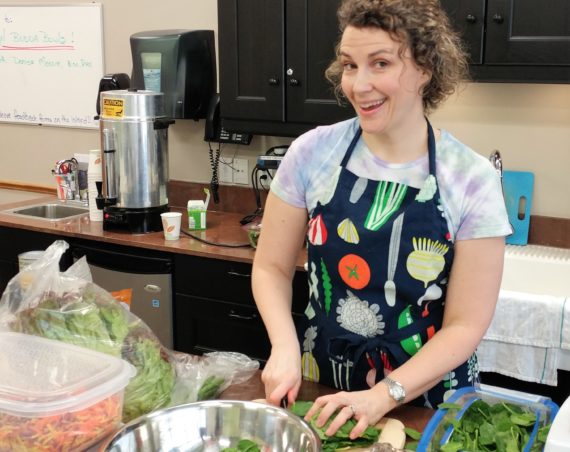

1 Comment
Sherika
This is a very interesting concept. I love what the big carrot stands for and how it caters to the community, its workers and the environment. That is why it has been around for so long and will likely be around for years to come.